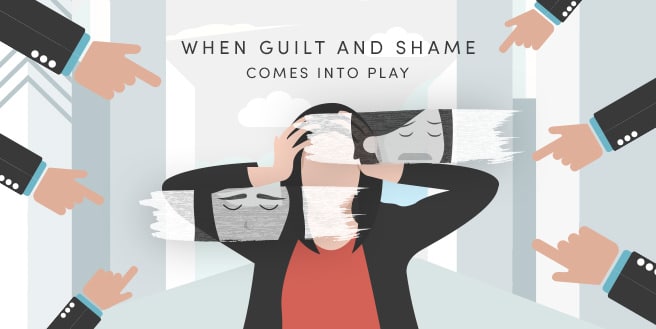When Guilt and Shame Comes into Play: Feeling Unproductive
A large majority of us keep a list of things that needs to be accomplished during a work day. At certain days, our to-do lists grow longer and longer almost as if tasks won’t stop piling up. When other projects linger unfinished for quite some time, we can’t help but feel ashamed of the accumulating stockpile of work in our desk.
We often feel guilt and its close relative shame when we’ve done something wrong. Guilt is an internal feeling we have on something that we committed, while shame involves feeling like a bad guy, in the context of what the public views as bad behavior.
It’s a common scenario found in different industries but the main question is, are both feelings helpful?
It depends. For us to know how the aforementioned emotions affect an individual’s work behavior, it’s important that we truly understand its nature – its root causes as well as its differences.
Guilt, shame, and feeling unproductive
Despite of its perceived similarity, guilt and shame arise from different attributions and elicits different responses. Shame arises when an individual regards the root cause of their failures to something unchangeable. All the while, guilt is what comes when an individual regards the reason for their failure as something changeable.
Both emotions relate to different aspects of agency and control. When we experience guilt, we resort to focusing on what we could’ve done differently or what we could do to be better in the future but when we feel shame, we direct our attention to how finer things would be if we were a different person. Say for example, a freelancer overlooked a deadline and fails to submit the collaterals he/she has been making for a client on time. If the freelancer correlates this misdeed to his/her behavior, she is likely to experience guilt but if the person attributes it to something core in themselves, he/she would feel shame – a much more devastating emotional experience than guilt for it promotes constructive responses to our mistakes.
A liability or an asset
Both emotions have its pros and cons. For example, guilt can be motivating. It has the power to increase one’s propensity to cooperate. In most cases, it will drive employees to work on tasks that have been stalled for quite a while. At its lowest, it doesn’t create much interference in completing projects but the guilt produced by the inability to work under conditions that are beyond one’s control can be painful.
Shame, on the other hand, relays a different story. It can be problematic in a sense that it prompts individuals to engross in habits that minimize contriteness and are unproductive to the organization. In fact, there are studies providing evidence that people will explicitly procrastinate to avoid shame. Realistically speaking, it’s almost never helpful.
Carrying the same amount of advantages and disadvantages, both can either be a liability or an asset.
So how do we avoid the negative effects of guilt and shame? We need to put a stop to rumination – the process of having repetitive thoughts about something anxiety-provoking – so that it would be less painful for us.
• Exercise self-compassion
Being kind to oneself helps alleviate the negative effects of guilt and shame. We must be willing to forgive ourselves for the mistakes we’ve made. A large majority of us would tell our friends who are in the same situation to “give themselves a break”, so we must be able to give ourselves the same advice.
• Focus on your accomplishments
According Gabriele Oettingen’s Rethinking Positive Thinking: Inside the New Science of Motivation, focusing on the space between what you have accomplished and what you want to achieve leads to feelings of dissatisfaction. Admittedly, that same energy can motivate an individual to act but when they are unable to do so, focusing on what you have achieved can give you a sense of pride.
• Practicing acknowledgement
One of the many outcomes of mindfulness technique is acceptance of one’s situation. This perspective is also useful when we are trying to overcome feelings of guilt. During these moments, it’s important for us to remember that no matter how bad we feel, it won’t help get rid some of the work that needs to be done.
With the innate tradition of needing to look “busy” to be labeled as “productive”, feeling guilty is simply unavoidable.
This type of culture greatly contributed to our anxious tendencies and the longer it stays, the harder it is for us to diminish this toxic habit. Luckily, today’s young professionals are implementing progressive changes in the hope of relieving their peers by starting in the root of it all – the workplace.
With the help of shared offices like coworking spaces that encourages well deserved breaks and reflective downtimes, freelancers and budding entrepreneurs are welcomed to a fresh culture – one that doesn’t berate you for being ‘unproductive’. Its supportive community of like-minded individuals are constantly reminding us that it’s okay to have some slow Mondays, the greater audience agreeing in unison.
If you’ve been feeling down lately, hit us up and maybe we can cheer you up!













Leave a Reply
Want to join the discussion?Feel free to contribute!